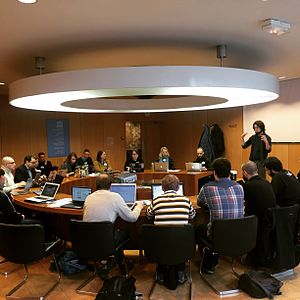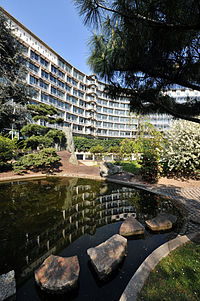Looking back on the 2nd European GLAMwiki coordinators meeting
Europeana supports the Wikimedia community in its cultural partnerships across Europe. This is what we learned from participants after the 2nd meeting.
Mid-February, more than 30 representatives from European Wikimedia affiliate organisations met at the UNESCO headquarters in Paris for the second European GLAMwiki Coordinators meeting. Both editions have been convened by Europeana as part of our ongoing commitment to supporting the Wikimedia community in its cultural partnership activities across the continent.
The audience
This edition attracted twice the number of participants as the inaugural meeting of this series in 2015. The two-day meeting gathered a diverse range of attendees, from Finland to Tunisia, Ireland to Macedonia. A third of them were women, which proves consistent with the 2015 event, although this latest edition counted twice as many participants.


Alex Stinson from the Wikimedia Foundation presenting a the Structured Data on Commons & Wikicite projects in the UNESCO roundtable meeting-room (CC-By-SA 4.0 from Wikimedia Commons). The Garden of Peace, UNESCO HQ. CC-By-SA 3.0
Guest presentations were given by representatives of the European Space Agency, the Smithsonian Institution, Histropedia, as well as UNESCO. Representing Europeana, Barbara Fischer, newly elected member of the Europeana Members Council, and Maarten Brinkerink, a leader in the Europeana Sounds project, were present alongside Ad Pollé and myself. A keynote presentation by Europeana 14-18 focused on the ongoing Wikimedia Challenge: 18 national Chapters have already sign up to participate.
Presentations and participation
According to the post-event participant survey, the best received presentations were those delivered by Effie Kapisalis - who also delivered a keynote address at the 2016 Europeana AGM in Riga - and Rebecca O'Neil from the Irish Wikimedia Community.

Effie Kapsalis from the Smithsonian Institution presenting "The state of U.S. GLAMwiki", Rebecca O'Neil from Dublin describing her thesis "Wikipedians and other citizen curators" - CC-by-SA 4.0 from Wikimedia Commons
There was a very high level of active participation: 67% of all attendees gave a full presentation or led a workshop, 42% gave a "lightning-talk" and 38% self-reported as having give "many" comments in the discussion sections.
Aside from those already mentioned, some of the other contributions included:
-
Ethnography of the Carpathians by Wikimedia Poland
-
Connected Open Heritage by Wikimedia Sweden
-
Coding da Vinci, more than a hackathon by Wikimedia Germany
-
Pattypan - uploading the spreadsheet way by Wikimedia Netherlands
-
Ajapaik.ee’s experience in crowdsourced geotagging and rephotography by Wikimedia Estonia
-
Grants for GLAMs by the Wikimedia Foundation
-
measuring GLAM by Wikimedia Germany
-
Mapping GLAM workflows and documentation by Wikimedia Sweden & UK
-
Wiki Loves Earth by Wikimedia Ukraine
-
and Wikimedia Switzerland's GLAM metrics tool
Not to be outdone, our host UNESCO Wikipedian in Residence John Cummings discussed "Reusing open license text and other new things developed at UNESCO". Behind its deceptively-simply title, his presentation showcased the wide variety of Wikimedia and open-access activities he had been involved in at UNESCO during his residency.
A positive feedback
The full list of presentations and any online documentation are available on the event program. All in all, 92% of attendees said that the meeting was relevant or very relevant to their role, 96% rated the event as being high or very high quality. 92% of attendees reported as feeling completely comfortable to participate whenever they wished (the other 8% reported some difficulties with the pace and level of English language). Most importantly, 96% believe that this event series should be continued in 2019 and 2020.
All these statistics are drawn from the post-event participant survey: the whole report has been published in the February edition of “This Month in GLAM”, the Wikimedia community’s newsletter showcasing the various cultural partnership activities around the world.

